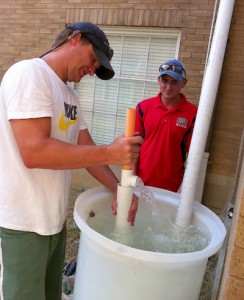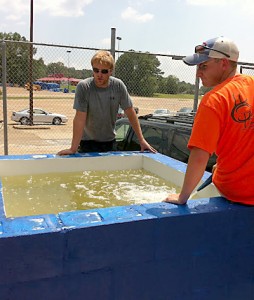
University of Mississippi engineering students Alan Barger (left) and Jimmy Jackson designed and built a manual pump as a possible tool to use in the field in Togo. They tested the pump in Oxford to be sure their design can raise water 90 feet, which is the depth of water in open wells in the area of Togo where the Engineers Without Borders-Ole Miss group anticipates working.
OXFORD, Miss. – Five University of Mississippi students and three faculty members are preparing to journey to a remote village in the African nation of Togo as part of efforts to improve life for natives there.
The Ole Miss chapter of Engineers Without Borders received approval from the EWB-USA to make an official assessment trip, set for Aug. 6-13. The students are Alan Barger of Greenwood, a civil engineering senior and chapter president; Jimmy Jackson of Greenville, a civil engineering graduate student; Maddie Costelli of Gulfport, a civil engineering junior; Elsie Okoye of Nigeria, a geological engineering senior; and Norman Seawright of Greenville, Ind., a senior journalism major.
Accompanying the team are Cristiane Surbeck, assistant professor of civil engineering and EWB mentor; Nancy Dupont, associate professor of journalism; and Marni Kendricks, civil engineering instructor and EWB faculty adviser.
“The purpose of this trip is to conduct an official community needs assessment in accordance with the EWB-USA model of exploration and evaluation,” Kendricks said. “We hope to be able to accomplish a few significant things; such as determining what the villagers think are their greatest needs that can be solved by EWB, forging acceptable partnership arrangements with the village leaders and creating a proposed five-to-10-year plan for phased-in infrastructure improvements for the village.”
Possible community projects include irrigation systems, greenhouse crops, treated potable water, wastewater system, fish and poultry management systems and solid waste systems, Kendricks said.
“If we receive EWB-USA approval for the first project, we hope to begin the implementation phase in August 2013 with another travel team of EWB-Ole Miss,” she said.
This month’s trip is the latest development in a laborious process that began with the formation of an EWB-Ole Miss chapter three years ago. Since then, members had to zero-in on the part of the world in which students would invest time and energy, submit multiple requests for travel approval to EWB-USA, coordinate and communicate with their NGO contact in Togo, the Rev. Kokou Loko.
“I have wanted to work on a project like this for a long time, and I can’t think of a better way to do it than with students,” Surbeck said. “I hope that people’s lives in the villages that we visit in Togo change positively with our visit. For myself and the students, I hope we gain a new life perspective while applying practical and creative engineering skills.”
The Ole Miss members also had to raise money for the work, build test systems, select members of the travel team, get international travel details arranged and prepare a daily agenda of all that must be accomplished while the team is in Togo Significant coordination is required for the work to be accomplished in a primitive rural village where natives speak the tribal language.

University of Mississippi engineering students Alan Barger (left) and Jimmy Jackson experiment with sand filtration and solar UV radiation to treat water from Oxford's Lake Patsy. They are trying to inactivate the total coliform bacteria content naturally found in pond water. The tests are in preparation of their visit to Togo as part of an Engineers Without Borders-Ole Miss project.
“The amount of student-led work that has been done thus far to move this project along to help a poverty-stricken people on the other side of the globe, whom most of our volunteers will never even meet, is absolutely staggering,” Kendricks said. “I could name at least 25 outstanding students who have, over the past three years, truly made this project come to life.”
After filing pages upon pages of EWB applications and conducting research on in-country topics, group members had water tests, pump tests, design idea construction and discussions with engineering professionals, Kendricks said.
“They’ve taken vaccinations, made presentations to Rotary Clubs, churches and at the ASCE annual convention, passed first aid courses (an EWB travel requirement) and more,” she said. “I am honored to know and have the pleasure of being around these kinds of individuals who are sincerely service-minded. They will absolutely make a difference in people’s lives in this project.”
Okoye said she is proud to be a part of the EWB chapter and this particular project.
“Engineers Without Borders-Ole Miss has worked on this project for about a year-and-a-half, so being a part of the team representing the group in Togo is a real honor,” Okoye said. “I grew up in Nigeria (a neighboring country) and I hope my background will help our group relate better to the Togolese culture.”
Costelli said being the youngest member of the travel team is both an honor and a privilege.
“This is an opportunity that I never thought I would have gotten,” she said. “I am looking forward to forming meaningful relationships and being able to help people that otherwise could not help themselves. I have a high degree of interest and am willing to do everything I am capable of to make this trip successful.”
Besides the members’ own involvement, the Meek School of Journalism and New Media is producing a documentary about their project. Dupont is supervising Seawright in producing what she calls an “extraordinary story in so many ways.”
“Here is a group of very smart engineering students traveling halfway around the world to help people they don’t yet know,” Dupont said. “All the students know now is that there is a need, and they are responding. This trip is the story of a lifetime. We can’t wait to show it to the world.”
Dubbed the “Blueprint Brigade” by Time Magazine, EWB-USA grew from little more than a handful of members in 2002 to more than 12,000 today. EWB-USA is working on 350-plus projects in more than 45 developing countries, including water, renewable energy, sanitation and more. These projects are completed in partnership with local communities and non-government organizations.
EWB-USA has more than 250 dedicated chapters, including university chapters on 180 campuses, making it a key player in a new movement to educate the next generation of socially conscious engineers deeply aware of the needs of the rest of the world.
For more information about Engineers Without Borders-USA, visit http://www.ewb-usa.org/. For more information on the EWB-Ole Miss project in Togo, go to http://www.outreach.olemiss.edu/study_abroad/togo_africa_project/index.html